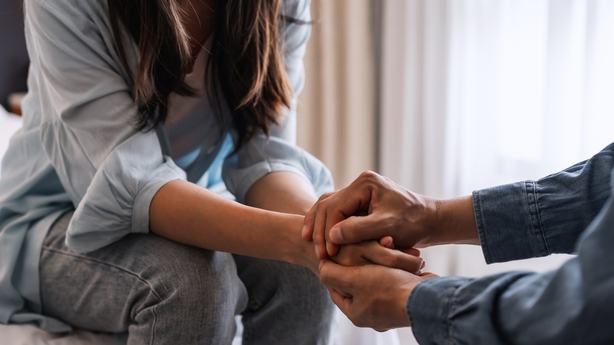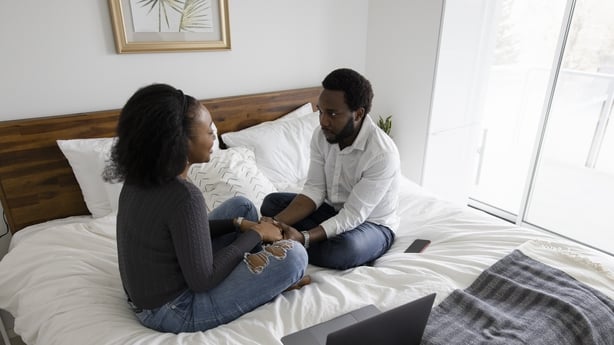Dr. Caroline West is a sex educator and host of the Glow West podcast, which focuses on sex, sexuality, and the body. Here she writes about how the journey to sexual intimacy after experiencing sexual violence can be a challenging one, but a possible one with the right supports.
The recent CSO statistics showed shocking levels of sexual violence in Ireland, with victims being of all genders and ages. The percentage of adults who experienced sexual violence in their lifetime was 40% - a far too large statistic.
This epidemic of violence is difficult to talk about, but Ireland has shown enormous progress in opening up this conversation and thus empowering victim-survivors to be supported in healing.

What we also need to talk about is recovery and consensual sexual intimacy. Sex is a vulnerable space and for many, making their way back to being comfortable with intimacy can be a difficult path, and at times feel impossible.
Victims-survivors can and do go on to enjoy pleasurable intimacy on their terms, but there are some barriers to overcome in their journey towards reclaiming autonomy and pleasure.
One of the most common questions on this topic relates to the timeframe for choosing to engage in consensual intimacy after experiencing sexual violence. Some people think they should be ready to engage in consensual intimacy by a certain time, that they 'should' feel ready after a certain amount of time, especially if they are currently in a relationship. However, there is no strict timetable in this area.
CEO of Dublin Rape Crisis Centre Noeline Blackwell explains some of the factors that influence the emotional healing process:
"This certainly comes up as a topic of great concern to those who have experienced sexual violence. It is also an issue for people who have been ill, bereaved, who have had any major life changes", she said.
"In the context of those who have suffered sexual violence, they can feel under pressure to 'move on', to 'get over it'. That pressure can come from professionals or from their own partners and trusted family, but it can also be in stereotypes about what's expected in a relationship.
"This goes to the heart of consent: how does a relationship navigate what one person continues to sees as an obligation, a core part of the relationship (sexual intimacy) while another's mindset and healing is simply not ready for that sexual intimacy.

"In such cases, honest, real conversations and adaptations can be very hard but if they are not had, then the relationship cannot be one where there is full agreement, full consent. And full consent is normally what a healthy relationship will want."
Removing pressure to be 'ready' by a certain time allows us to recognise that healing is not always linear. Comparing ourselves to others or to an imagined timeframe can hinder the healing process as this pressure often goes hand in hand with shame. Feeling like we ‘should’ be ‘healed’ can lead to feeling like there is something wrong with us. This is not the case, and treating ourselves with compassion and empathy helps us to heal in our own way, on our own timescale.
Research shows that healing from sexual violence has four main components: managing memories, being able to relate to important others, establishing safety, and re-evaluating a sense of self. Building a safe world takes time, and will look different to each person.
The devastating effects of sexual violence can include long-term mental health issues, and the idea of engaging in sexual intimacy can be a thought that provokes chills rather than excitement. This fear can be difficult to process, but Blackwell explains how people can navigate this fear:
"If consent is about agreed actions and understanding and mindset within a relationship, then there is no substitute for those in the relationship understanding the mindset, fears and concerns of the other. Help from professionals can be very useful - but those professionals must also understand that non-consensual sexual activity is not acceptable and can be very harmful.

"Fear can be successfully addressed through trained therapeutic interventions - it happens in our place all the time! But it's not easy for partners either - the understanding of the deep impact of trauma is still very limited. It's invisible and respect and an ability to learn and grow is necessary. That's true even beyond partners to one's wider community."
Adopting a trauma-informed approach to how we understand and talk about sexual violence means that we have the opportunity to reject rape culture and build a culture of consent where all victim-survivors are treated with empathy. This process involves learning about the spectrum of sexual violence and building inclusive and accessible supports for victim-survivors.
Community supports have proven to have an enormous positive influence on recovering from sexual violence. Cross societal challenging of victim blaming and stereotypes about sexual violence is a key way to dismantle rape culture. This involves facing the uncomfortable truth about who perpetrates sexual violence.
Around the world, statistics show that in contrast to the idea of rape being committed by strangers in dark alleys, most victim-survivors knew the perpetrator. Blackwell explains how this existing relationship to the perpetrator can be traumatic:

"While sexual violence by anyone is shocking, our figures every year and the CSO survey now all show that most people who experience sexual violence know the perpetrator and very often, the perpetrator is someone they know well and trust: a member of their family, their friend group, their community, their partner. And still the meme is of the stranger rape, which is why we are putting such an emphasis on building a national conversation on the meaning of consent (and its corollary non-consent) in DRCC.
"In addition to the innate harm done by the violation itself to the body, the emotions, the psyche, the breach of trust can add to a sense of hurt and confusion and a sense of self-disappointment for investing their own trust in the first place in the other person. Expectations are higher, meaning the impact of the violence can be too.
"There can also be added societal pressure because identifying and naming the sexual violence can have implications for how the trusted community react. Naming a known person may disrupt the community, family who don't want to know, who don't want to deal with it."
Healing is not just an individual effort- we can all play a role in creating a society that tackles the prevalence of sexual violence, refuses to make excuses for perpetrators, and supports victim-survivors through a compassionate, trauma-informed approach. There is hope for exploring intimacy again on your terms and your timeline; self-compassion is the first step.
If you would like to speak to someone about sexual violence, please contact your local rape crisis centre, who work with victims of all genders and orientations, on 1800 77 8888.
If you have been affected by issues raised in this story, please visit: www.rte.ie/helplines.
The views expressed here are those of the author and do not represent or reflect the views of RTÉ

